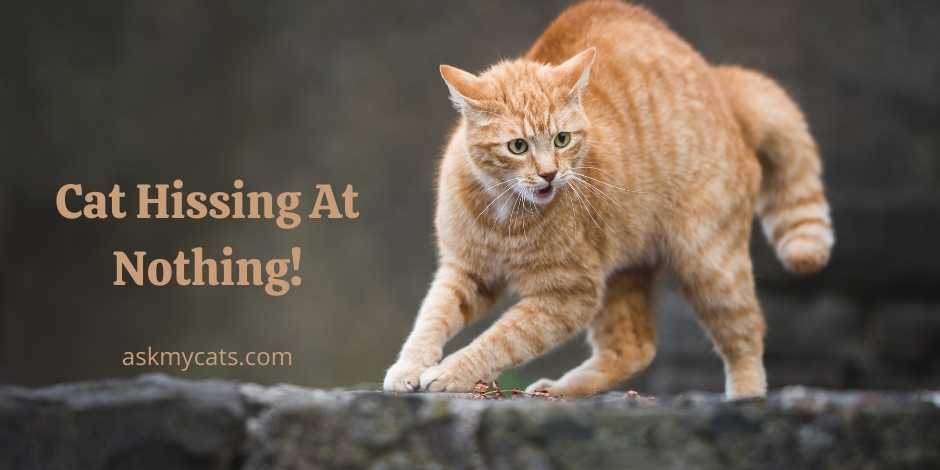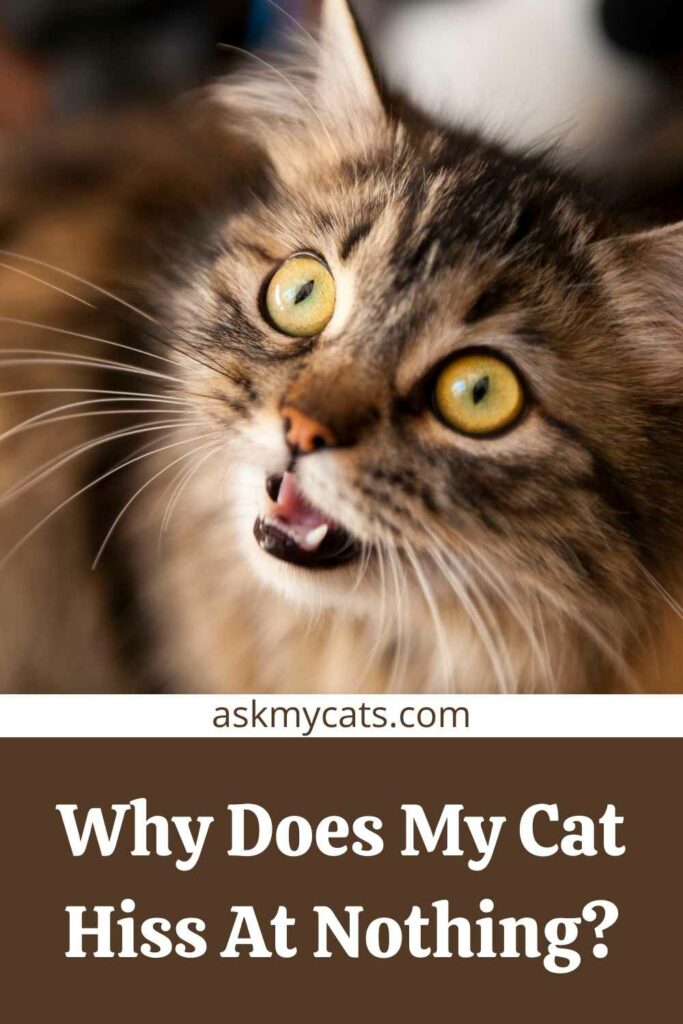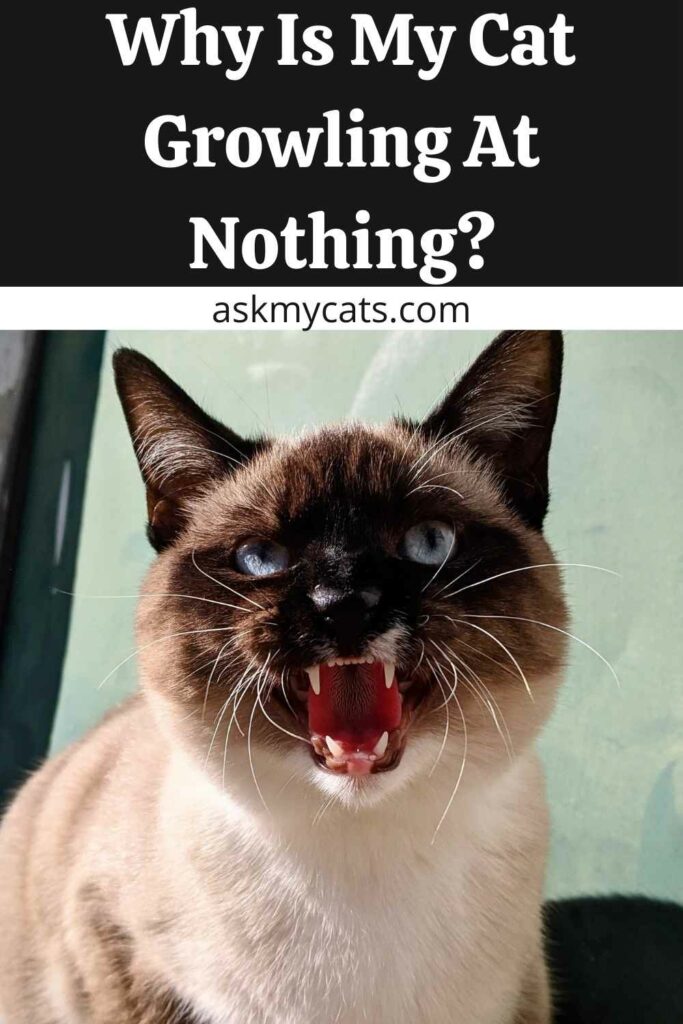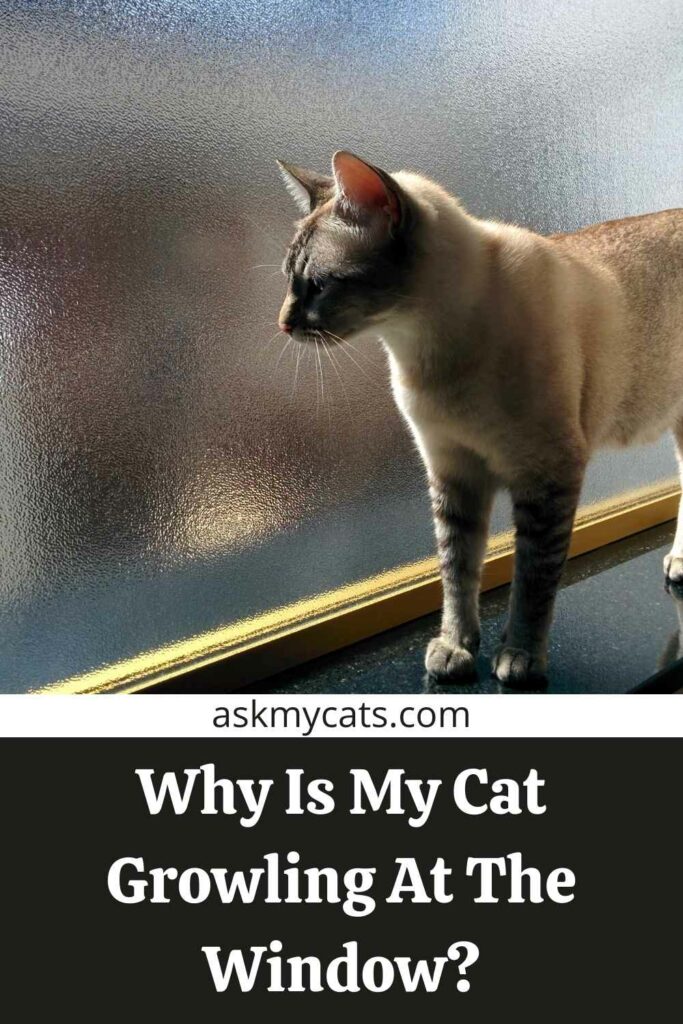Cats are mysterious creatures, which add to their attraction. They’ll knead you or rub their face against you one minute and then ignore you the next. They may go from purring to sitting in a corner in the blink of an eye.
Cats generally hiss after seeing or hearing something you can’t see or hear with your restricted, mortal senses.
Since cats have different perceptions than humans, seeing your cat hiss at nothing might not suggest she’s seen a ghost.


Give Your Cat the Perfect Day
Get the Free Ebook!
Why Does My Cat Hiss At Nothing?
Your cat hisses at nothing when they observe something wrong in his surroundings and tries to catch your attention.

It’s considered that a cat’s hiss is a type of defensive mimicry. That is, it is considered to sound quite similar to a snake’s warning call, which is used to deter predators. The posture and hissing sound used by cats is intended to accomplish the same thing.
When a cat hisses, its ears flatten and roll back, its mouth opens to display its fangs, and its body position changes to signal that it is about to strike (bite or scratch). You could even notice a tail swishing. It’s conceivable that you believe your cat is hissing in response to nothing in particular, but with a little detective work, you can figure out why.
If your cat is acting erratically and hissing (rather than just being hyperactive and playful) you should make an appointment with your veterinarian. This reaction might be triggered by arthritis, dental troubles (which can be exceedingly painful), thyroid diseases, neurological illnesses, and other abnormalities. With the advice of a veterinarian, you should be able to rule this out.
Cats communicate in a variety of ways, including growling and hissing. A cat that is snarling and hissing is typically a fearful cat.
According to the Humane Society, cats have a wide range of vocalizations that they utilise to communicate with other cats and people. A cat that is growling, hissing, or spitting indicates that it is anxious, scared, or upset about something.
The trouble is that we don’t always understand why a cat is growling. Even when a cat appears to be looking at a wall, they are able to detect things that people are unable to. Since cats evolved to be hunters, they have excellent vision.
Your cat, for example, may observe the movement of a dust particle or something else that piques his curiosity but is on a very small scale.
“Back off now, or else,” your cat is basically saying when he growls and hisses. A roar is usually only a warning, and he won’t attack. Hissing and maybe arching his back are common accompaniments to growling. The goal is to make himself sound and appear so intimidating that whatever is upsetting him will back off.
Why Is My Cat Growling At Nothing?
When a cat is in difficulty, it will growl. Cats can growl as a result of pain caused by physical conditions such as urinary tract infections, dental problems, trauma, arthritis, and various metabolic diseases including hyperthyroidism.

Maybe those growls were only a reaction to his suffering! The meow of an adult cat, perhaps the most often heard cat sound, is almost solely used to communicate with humans, not other cats. Older cats meow more often owing to diminishing senses or fear over not being as agile as they once were.
The frequency at which a cat meows reveals its mood; rapid-fire meows signal, “Hey, pay attention to me, I’m talking here!” The yowl is a common form of cat communication, and it can imply anything from “I want to mate” to “I don’t want you coming near my home.”
It can also happen when a cat isn’t feeling well, when her senses or cognitive abilities deteriorate, or when she doesn’t like anything in her environment.
Cats who are transferred to new areas or adopted into new homes frequently yowl their dissatisfaction with their previous living quarters.
Be wary of any cats that may be “invading” your cat’s area; stray or feral cats may need to be captured, neutered, and ideally adopted out to the proper household in certain circumstances. Shorthaired cats are, on average, more communicative and extroverted than longhaired felines.
Why Is My Cat Growling At The Window?
Your cat has seen something disturbing out of the window and so he is growling at the window.

‘Nothing’ is unlikely to make your cat snarl. If you could see how many creatures travel through your yard at night, such as stray cats, raccoons, possums, and even coyotes, you’d be startled. Even if you live in a city, these creatures have evolved to survive in close quarters with humans.
Apart from animals, my cats have warned me to lurking humans, so learn to pay attention when they suggest there’s anything out there.
Our cats have far better eyesight and hearing than we have. It doesn’t imply your cat is imagining things just because we can’t see or hear what’s “lurking” in our yard outside our windows!
Don’t assume there’s nothing more out there. Cats have better night vision than humans. Kitty may even be displaying a protective personality in order to protect their human housemate.
You have no idea what the cat is snarling at. As an ambush predator, a cat might be alerted by the tiniest movement or shift in shadows. Who knows what lurks in the shadows? Other cats, wildlife, and even flying insects may convert a normally calm cat into a wary creature.
Why Is My Cat Hissing At The Wall?
Cats hiss at the wall because they have noticed some insect or pest up on the wall.
Cats appear to be playing games with themselves at times, as if everything they’re chasing or doing is part of something that exists only in their thoughts and not in the actual world.
The second possibility is that, as a cat, she is just attempting to frighten her owner. They enjoy doing things like that. Nobody can genuinely comprehend a cat!
Cat Randomly Hissing While Playing
Your cat is randomly hissing while playing to express his excitement.
Hissing isn’t usually associated with feline roughhousing. Their playful antics include biting, swatting, pouncing, and chasing each other, with the tiny cats biting, swatting, pouncing, and chasing each other.
Cats prefer familiar objects that help them feel secure and at ease. As a result, new things in their environment – such since a new toy or furniture – can occasionally cause your cat to hiss, as they might make them feel nervous.
Why Is My Cat Growling With A Toy?
Your cat will growl with a toy because he likes to play with the toy.
Growlings are a natural method for cats to communicate. However, if your cat is snarling and hissing at something you can’t see, it’s a good idea to get him examined by a veterinarian.
If an external issue is irritating your cat, such as a barking next-door dog, attempt to calm him or give him control over his environment by providing him with secure, peaceful areas to hang out.
Frequently Asked Questions
Is it bad to hiss back at your cat?
You should not hiss at your cat since it will frighten the small animal and make it afraid to approach you. Cats communicate by movement, eye contact, tail and head bumps, and hissing. When you replicate your cat’s language, they’re more likely to recognize when they’re doing something wrong.
What does a low growl from a cat mean?
Cats also create growling sounds when they are agitated or seek to scare away a potential threat. When cornered, kittens and adult cats may snarl. They’ll hunch their shoulders and puff out their tail and other hairs. A low-pitched growl generally serves as a warning, instructing the danger to back off.
Should I punish my cat for hissing?
While it is theoretically permissible to reprimand a hissing cat, this does not imply that it is effective. For the best outcomes, discipline should be applied indirectly, since scolding your cat like a dog would not provide the desired consequences.
Final Words
Cats can be stressed or intimidated in the same manner that people do, but they don’t express themselves in the same way. A hiss or perhaps a growl is a common form of communication for cats. You might believe it’s the same as hitting someone in the face—an act of rage.
Leave your questions in the comments section below!
